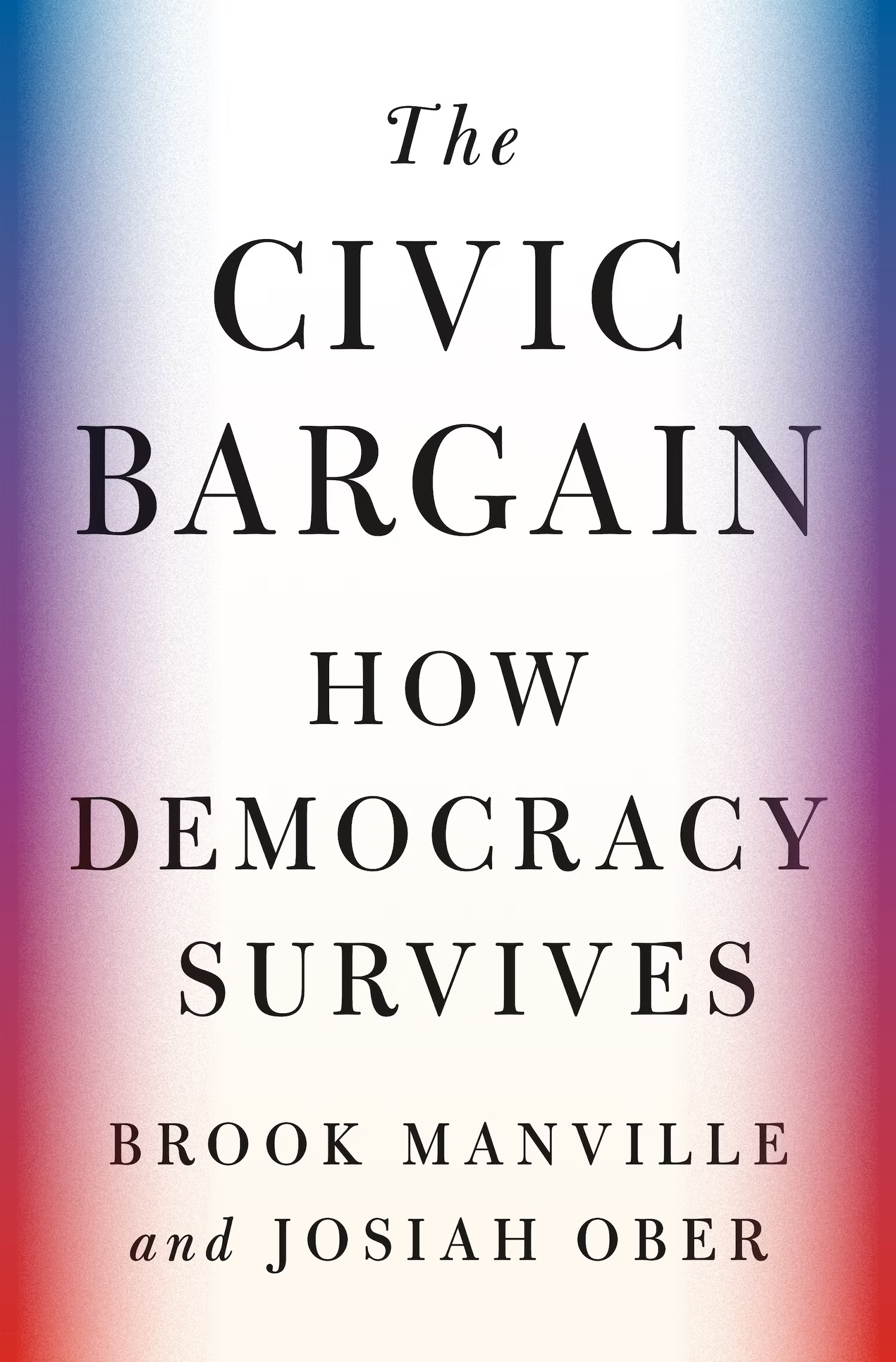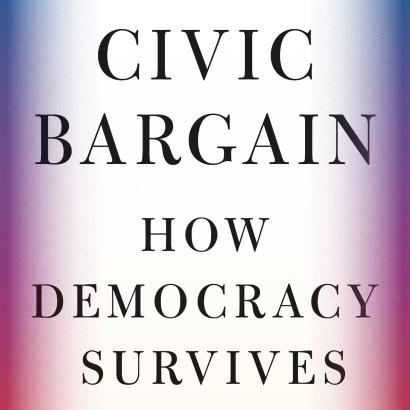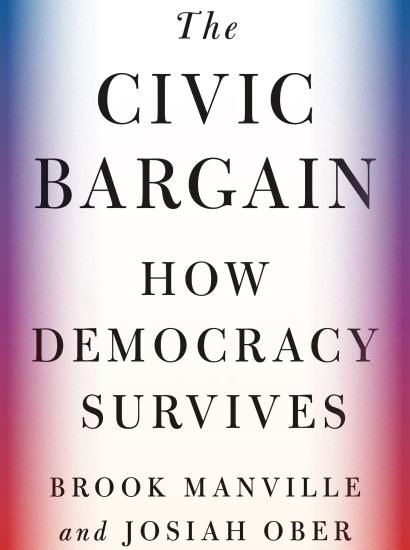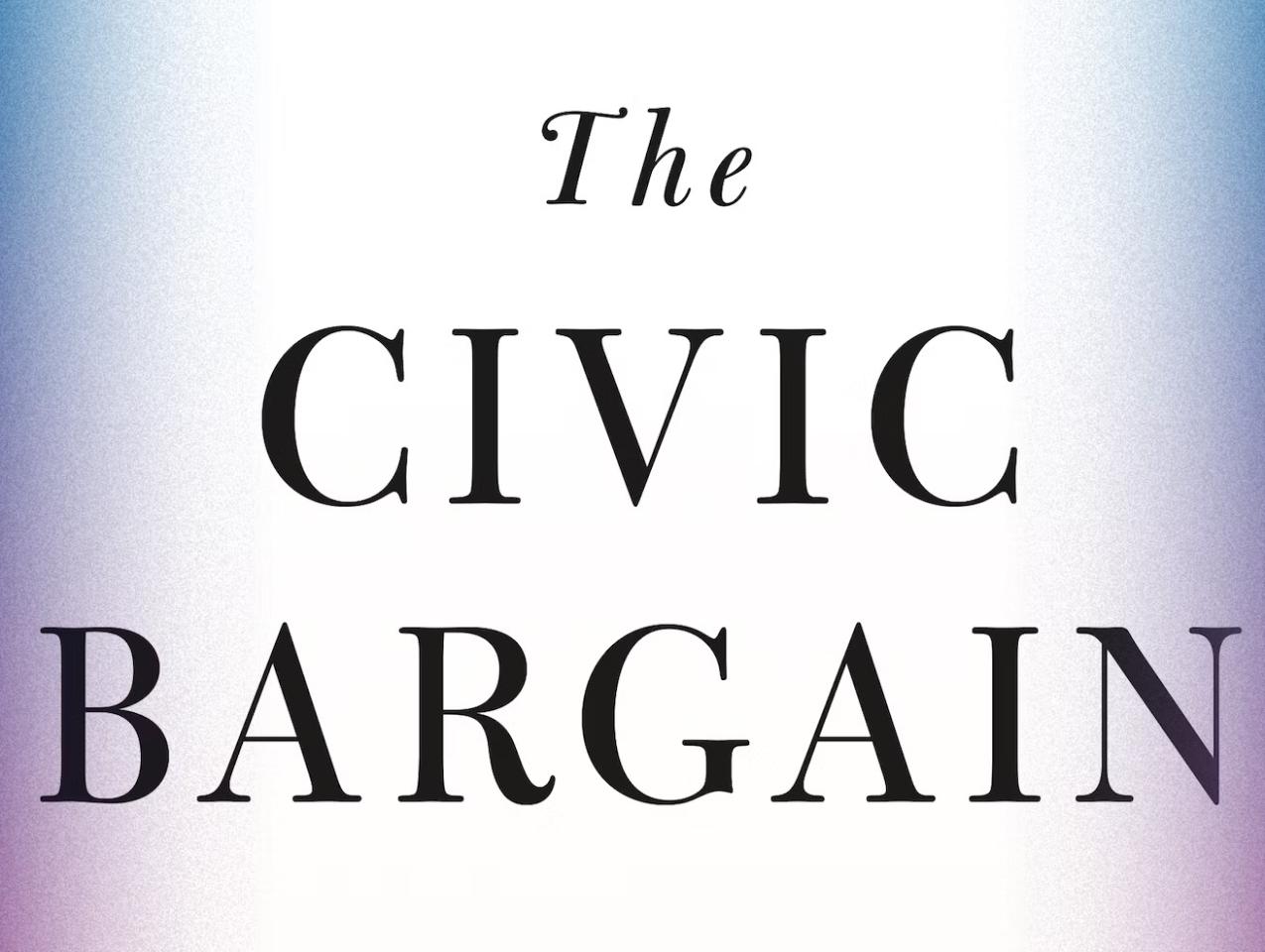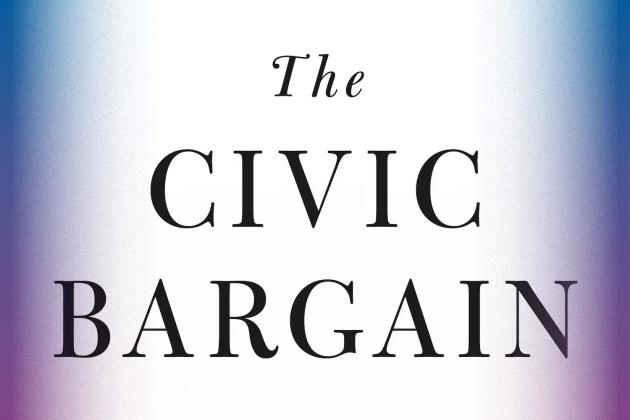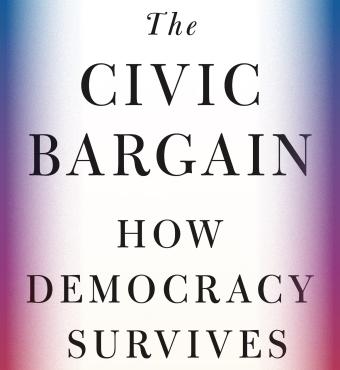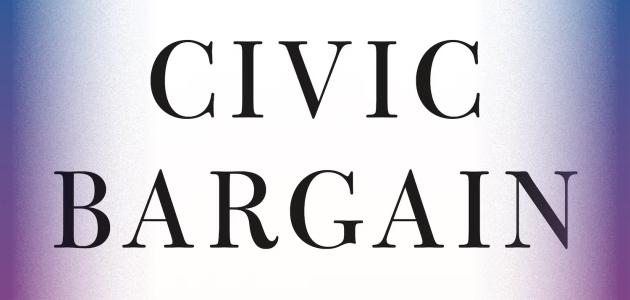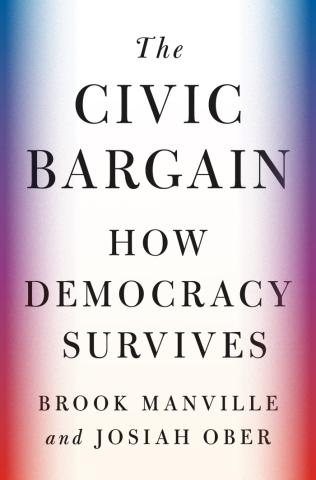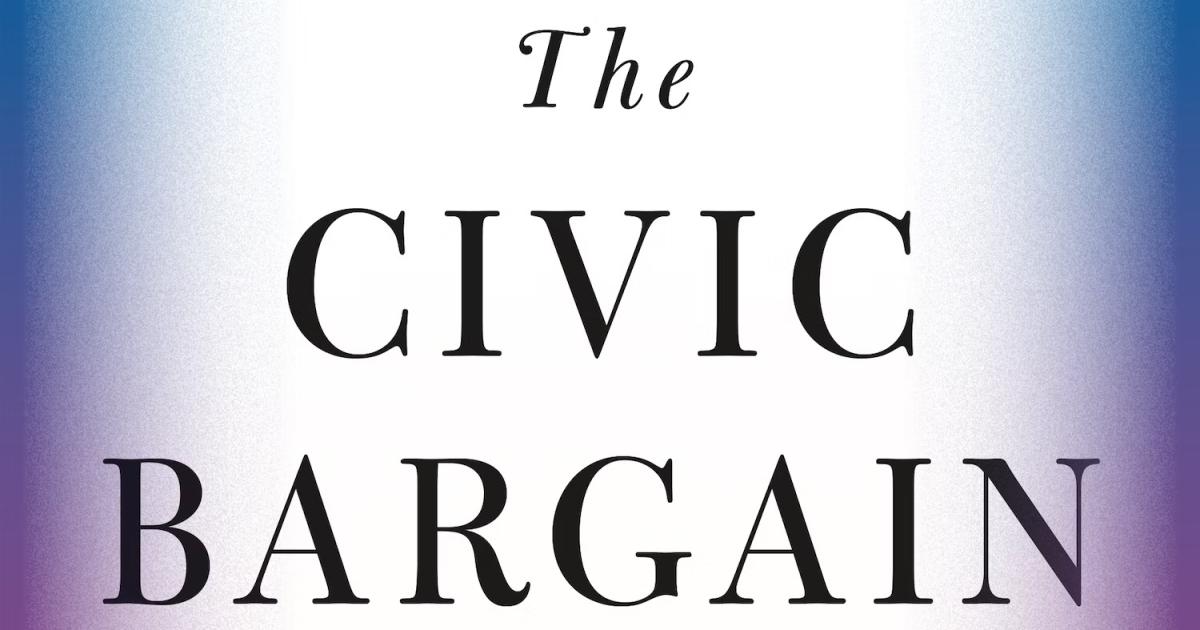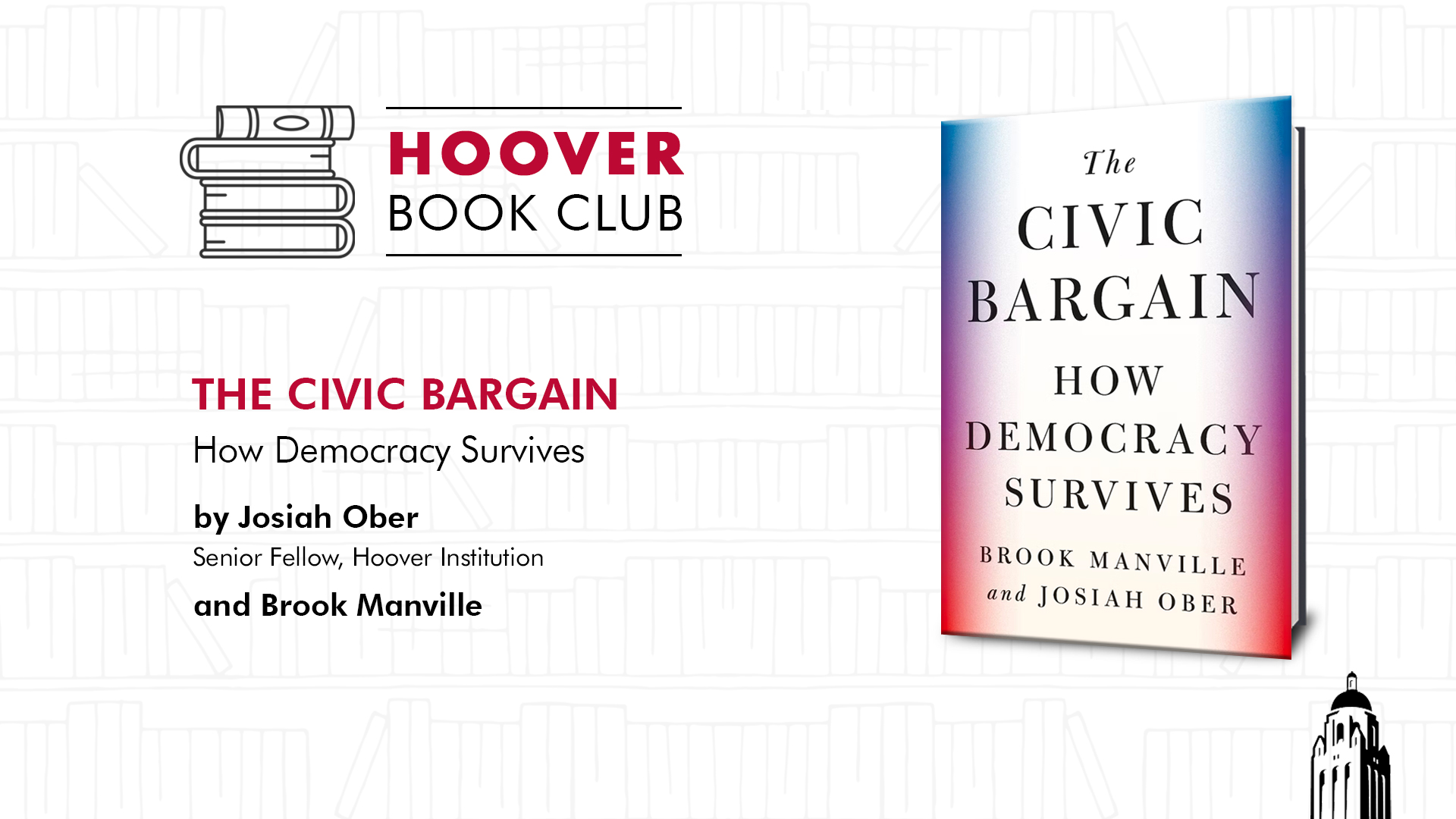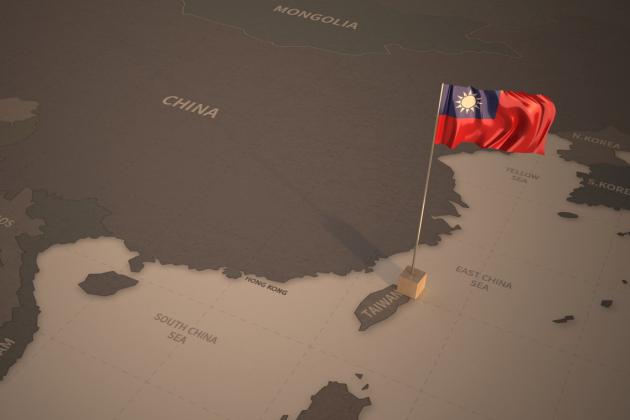Join the Hoover Book Club for engaging discussions with leading authors on the hottest policy issues of the day. Hoover scholars explore the latest books that delve into some of the most vexing policy issues facing the United States and the world. Find out what makes these authors tick and how they think we should approach our most difficult challenges.
In our latest installment, watch a discussion between Josiah Ober and Brook Manville, authors of The Civic Bargain: How Democracy Survives.
Tuesday, September 19, 2023 | 10:00 am PT / 1:00pm ET
WATCH HERE
>> Josiah Ober: Hello, I'm Josiah Ober, senior fellow at Stanford University's Hoover Institution as well as a professor of political science and classics at Stanford and I'm also the faculty director of the Stanford Civics Initiative. I'd like to welcome you to the latest installation of the Hoover Book Club where we bring Hoover fellows and friends together to discuss our latest writings.
And today, I'm joined by my friend and collaborator, Brook Manville. Brook is the principal of a consultancy focused on strategy, organizational development and executive leadership. Brook has special expertise in knowledge, strategy and management, organizational learning, and leadership development. He also serves as an executive coach for nonprofit and for profit leaders.
Brook and I are perhaps, most importantly, at least for today's purpose, the co-authors of a new book, the Civic Bargain, how democracy survives. So Brook, welcome to the Hoover Book Club.
>> Brook Manville: Thank you, Josh, it's a pleasure to be here.
>> Josiah Ober: And we're often asked by friends when they hear we're writing a book together, why did you guys decide to write this book and what really is the headline?
So what do you tell them, Brook, when you get that question?
>> Brook Manville: Well, I usually give them a little background. You and I will remember that we were together at the National Geographic Society several years ago. It's when the tempo of pessimism about our democracy was beginning to rise.
We had a number of people in the audience who were quite anxious about the question, including as you recall, a Supreme Court justice and as we made our presentations which were relatively superficial looking back at the time. But nonetheless, we had a lot of interesting questions. And it was clear that our fellow citizens, those in the room and beyond were beginning to be very anxious about that.
People were seeing the growing polarization of our politics, the gridlock, that kind of thing. And then there was a flurry of books that were starting to come out, which is all about democracy dying. It's all over, get ready for authoritarianism and so on. And we looked at each other and said, that doesn't necessarily hold true.
You had the interesting insight at the time that, gee, maybe instead of thinking about democracy dying, we need to think about what makes it work. And we sort of riffed on that a little bit before the audience, and that later segued into kind of our approach to this book.
We wanted to look back at history instead of saying, why did Rome fall or that Rome lasted a long time, ancient Athens lasted a long time? We've got two modern democracies that have endured for hundreds of years, the British parliamentary system and, of course, our own constitutional system as beleaguered as it may be.
And we said, what can we learn, looking back at history, about how democracies actually endure? What keeps them resilient? How do they survive? And then we started some historical research, which took us several years, frankly. But through it all, we were motivated by this sense that what we needed to do was get to some fundamental questions.
In my consulting work, it's always, what's the real problem we're trying to solve? And how do you get to sort of essential principles or fundamentals to wipe the slate clean, think creatively and that's really what we started to do.
>> Josiah Ober: Yeah, I remember when we first started having these conversations.
You and I both have a background in ancient history and we both done a lot of work on the history of ancient Athens. And one of the issues that obviously comes up then is, well, not, why does this not last forever? But why did it work at all?
And so we were sort of prompted to think that way. And we knew enough about the roman case that we felt, well, we could probably get into that. But then, of course, it did take us a while to become sufficiently expert, especially the British case as well as the us case.
But what really did come through to us all along is that there are some real continuities, there are some fundamentals that allow self government by citizens to work over time to get through both the speed bumps and the really serious crises that every political system runs into. And it really was those fundamentals that when we began to feel that they were becoming evident to us, that we, I think, really felt we had a book, had something, something really to say.
>> Brook Manville: Yeah, well, you touched on a couple of things that I'd love to just underscore, again, this idea of fundamentals. Because we discovered, at first, as we were reading the material about these cases of well known democracies. We knew Athens, we started new Rome. But people naturally said, well, what do these have to do with each other?
I mean, the parliamentary system is so different, and what is America gonna learn from the Athenians, other than mob violence kills people like Socrates? And we had to sort of look beyond it. And we said, well, of course there are differences in institutions. There's differences, of course, in context, but there are some fundamental things that are kind of the same.
And you touched on what really became one of the core thoughts in our book, which is if you really strip away what democracy is about, it's the self governance of citizens. Now, they might do that in lots of different ways, but at the end of the day, it is that citizens are in charge of themselves.
And it was, I think, thanks to you from some of your earlier thinking, that we developed this very accessible phrase, it's living and making decisions without a boss. Democracy basically is without a boss. And I think that's very important because not only is that an accessible comment, but a lot of the confusion and thus a lot of the sort of stress in public debate about, quote, saving democracy is people have so many different ideas about what democracy is.
And particularly, for example, there's a common sort of assumption that democracy is the same as liberalism. You've written about that and that democracy can't be equated between a representative government and so called direct government. But I think you should say a little bit about that and why no boss is so important to getting this kind of inquiry going.
>> Josiah Ober: Yeah, so this is one of the things that really came out for, I think both of us in doing the historical work is that when you really get to the essence of what it It is to have a democracy. The rejection of an individual or a small gang, a junta running things, it is that refusal to be run by a boss, whether it's a gang boss or an individual boss, is what is common to each of our four cases.
And we began to realize that that really is the essence of democracy. Now, of course, if you're going to have a society that's workable, especially a society that is in rivalry with other boss-run states, then you're gonna have to have system of organization. And that means not having a boss requires that we're each other's boss.
Anarchy, in a full sense, really isn't an option in any kind of competitive environment. And so being our own boss, being our collective boss of one another, is really what democracy is about. And that becomes then a real challenge. How do we govern ourselves, no boss but one another, without simply turning into something like majority tyranny?
Or other of the well known pathologies that democracy can fall into?
>> Brook Manville: Well, of course, the political science literature certainly is very full of examples and gives rich discussion of this kind of thing, so I think we're in good company with that premise. But when I talk to some of the audiences that I've been discussing the book with, I often bring to bear more everyday experience.
Most people who work in business or some kind of an organization a church group or a school or whatnot, have faced some kind of project where, a lot of people have to be organized together develop a picnic, develop a science fair, develop an outing for this department. And people start to realize very quickly, the easiest way to do it is to have somebody in charge, and then people follow.
But people often, in those situations, somewhat idealistically, say, let's do this more democratically, and more often than not, it turns into a mess. It's very hard to actually make that work, particularly when the organization gets bigger. And so people understand sort of intuitively that organizing things for yourselves with nobody in charge is hard.
But if you believe in it, then you've got to do some things that are difficult. And I think that was another early aha of our research kind of, it was obvious, but it's not often talked about. Democracy is very hard, it is messy. It is not the sort of default organization through history that has succeeded.
And appreciating that difficulty, I think, is another part of sort of framing this question, really, in a way that people can understand and is meaningful.
>> Josiah Ober: Yeah, absolutely, collective action is a challenge, and democracy needs to come up with an answer to those challenges. One of the things about living without a boss is that people require or demand or expect freedom, and they expect a set of basic rights that maintain them as free individuals.
So rights are always part of a democratic story. And yet what I think that once again seemed to be very clear to us as we were doing this research, is that all rights come with duties. There isn't any right without a corresponding responsibility. And if we multiply rights indefinitely, if we're not careful about creating new rights, we end up putting more duties on ourselves than we're willing to take on.
And at that point, the whole thing can fall apart, so this is why the no boss is just where you start. But if you add too much into that in terms of rights without corresponding duties, you get into trouble very quickly.
>> Brook Manville: Yeah, and again, back to sort of the everyday life.
I mean, one of the sort of axiomatic cries that people in this country say is, it's a free country, I can park my car here if I want to. Or it's a free country, I can have as many guns as I want. It's a free country, I can tell my kid whether or not he or she should go to school and so forth.
The problem is that that kind of rhetoric, although it's very empowering, does lack that rejoinder historically, that when you have rights, you have some duties. You have some duties to each other. And many of the antagonisms in our politics has to do with what is a right that is natural?
Or what is my right as a particular citizen in a particular state versus what I'm supposed to do with that. And I think another thing that has sort of informed our book, which we'll get into more, is that this question of liberalism and whatnot. Much of modern democracy has been defined around the impositions of the government upon my life.
That running away from the government and keeping the government small and keeping the government at arm's length is a lot of how democracy is defined. But if you go back in history, as we did, you realize that that notion about the government had its roots much more in a world where the citizens were the government.
And that there is still a legacy of that notion of obligations as part of the deal of not having a boss. And again, I think that has been forgotten, and I think one of the things our book, I would hope would do would remind people that, again, if you care about history.
There are some lessons that you can't just think about what are your freedoms, but also what are your responsibilities to make the community of citizens work?
>> Josiah Ober: Yeah, absolutely, so when we started out, we thought, all right, the no boss thing is where we're gonna ground ourselves. That's gonna be our definition of democracy.
But we began to see that there were other essential conditions that were necessary if a group of citizens were going to rule themselves without a boss. So we start out recognizing that unless the people or the citizenry can maintain basic security against external threats, but also against internal violence, and can maintain basic welfare, so we have a life that is at least decent so that we're not impoverished.
If we can't maintain security and welfare, then it's not gonna work. We're gonna absolutely have to have that? Well, if you've got a boss, the boss may be able to maintain security and welfare without having to really much worry about who's involved with this. Because the boss or the minions of the boss are doing the work.
But when we move to a self government, we're gonna have to worry about who are the citizens, who are we? And then, as we were saying, what really are the duties of the citizens? So both the definitional question, who is the citizen body? And then what do we expect of one another as citizens, are gonna be absolutely essential.
If we don't do those things, we don't maintain basic security and welfare and know who we are, it's not gonna work.
>> Brook Manville: Yeah, I think this is another very interesting sort of lens on current debate and some of its missing pieces, if I may. So when people talk about democracy and wanna talk about saving it, if they're not trying to save what some people would call liberalism, they're trying to save particular institutions.
We need to change the Supreme Court or we need to expand the Senate or we need to end the filibuster. And I think that when we think about fundamentals, institutions are obviously a very important part of the story. And you find them, though they are different in Athens, in Rome, in the british parliamentary system.
You can see some parallels. But the things that you mentioned are kind of, I would say, often forgotten or taken for granted prologues. One is this whole notion of no boss. Our country was founded in defiance of ever letting another King George be in charge. But secondly, that you touched on, there has to be a level of basic security and some minimal welfare.
That's at least better than having it under a bus. And then you have to have clarity about who is the citizens. And it's interesting, if you look at one of the contemporary arenas of acrimony and debate, it's just about those things. We have millions of people moving around the world now trying to escape tyranny or anarchy, and where do they come?
They come to places where there's the chance of some level of security. If you're from Guatemala or Nicaragua, you are delighted at the relative safety of the streets of America. You hope for some chance to at least make a business based upon the rule of law and some degree of relatively uniform police protection and economic support and so on and so forth.
And so, not surprisingly, people are coming to a place where it works. And people say, here in this country, it's disastrous, our police is out of control or so. But on a relative basis, it still works pretty well compared to the rest of the world. Coming from a boss or an anarchy background that then generates problems with the second or the.
I guess it was our third condition about citizenship. Suddenly you have more and more people here. They wanna be part of the story. After they're here for a while, they say, well, gee, I ought to be able to vote, I got Social Security. I've been doing my work and then there's all this stress and anger about, who are these people?
Why do they belong? Should they belong? No, they don't belong, and so on. And of course, through history, the notion of outsiders coming into democratically governed but prosperous organizations or states is an old one. And that then generates this problem of scale. You get more and more people here, and if you're gonna make them part of the bargain, we use this word, the civic bargain, the agreement of how, as citizens, we will govern ourselves.
It starts to get more and more complicated. If you don't wanna make them part of the bargain, then you have these barriers in society which can be very negative. And they can also be positive if you figure out how to work in a more, call it multicultural kind of way.
So I think those conditions, again, people see them as separate political debates. They're root and branch part of any democracy. And it's why we included them as part of our list of seven essential conditions.
>> Josiah Ober: Yeah, absolutely. So once we've decided who the citizenry is at any given moment, and of course, that changes, as we saw in each of our cases, the answer to who are the citizens?
Does change over time. Certainly it's changed dramatically in the United States since the beginning. But the key thing is that once we've decided that, is that we've got to create some institutions. As you were saying, there are various kinds of institutions that will work in order to have self government.
But they all come down to this core requirement of creating a bargain among the citizens. This really was the big aha of our book, is that every democracy is based on bargaining among the citizens. Hard bargaining, difficult bargaining, but negotiation, compromise that allow us as a citizenry to go on together.
And to accomplish the things that we want to accomplish as individuals, but also to accomplish things that we need to accomplish together to achieve the public good. So it was that notion that if you can't bargain with your fellow citizens, if you refuse to make a compromise. That will gain all of us more than we would have if we were not willing to engage in a bargain, that seemed to be really the core of what makes democracies work.
>> Brook Manville: Yeah, and bargaining, it's a multifaceted word. And it's worth unpacking a little bit because I think a lot of what's interesting about our book is to bring out some of these complimentary dimensions to it. First of all, we often use it, we people in everyday life, as kind of some kind of negotiation.
You do this, I do this, I'm gonna pay half. Okay, I'll take half, whatever. And people are familiar with that. But when you get back to no boss except each other, then the immediate imperative becomes some kind of bargain, okay, if I'm not gonna be in charge any more than you are.
We're gonna have to kind of find some middle ground about how we're gonna make decisions when the enemy is attacking us. We're gonna have to find some middle ground or agreeable way to deal with your religious beliefs, which, by the way, happen to be different than mine. If the king says everybody's going to be a Catholic, that's one thing, but we don't have a king telling us that, so we have to learn to negotiate with one another.
Because that comes along with no boss. The second dimension of it, which is very interesting, is that the whole notion of democracy as a bargain is traceable through history back to bargaining. That kind of was a precursor to full democracy. If you look back at the Athenian case or the Roman case or the British case, all the cases, there were sort of intermediate, call it deals or understandings that were created, that started to give people who had been pure subjects, if you like, of a king or a tyrant, a little bit more rights.
I mean, the British case is interesting. The parliamentary sovereignty which is now in place evolved over a very long time. But if you look back way before, kind of the turning point of that in the 17th century, the king was granting certain protections to subjects. He was insisting that the nobles tap into people from their realms to agree about the taxes that were being charged.
It was a decision that was made, we're not gonna just kill people unless they give us money. We're gonna give them some protection. They're not full democratic citizens. They didn't have that word. But we're gonna give them some limited protection in exchange for essentially being better subjects. And in Britain, the Magna Carta is a famous example of this, that the king said, look, if you will support my campaigns in France, we're gonna start to put in some basic rights about trial by jury and protections and that kind of thing.
And you can look at Athens, you can look at Rome, and of course, even in our country, before we had our constitution, which was one formal version of a civic bargain, in this country. There was this essentially failed effort to make a bargain called the articles of Confederation.
But there was still an attempt to find some middle ground between states' rights and central rights. They didn't quite get it right, but it worked a little bit for a while. But again, by learning through the bargaining process in a pre democratic world, this idea of democracy as essentially an agreement amongst more and more equal, eventually equal citizens, was essentially the evolutionary process that led to full democracy.
>> Josiah Ober: Yeah, exactly, I mean, we often think in our American case, that our democracy comes about because of a revolution. And that's true, of course, there is a revolution, but that revolution was preceded by a series of bargains, local bargains, among people in each of the various states or the colonies, which become the states of the United States.
These were really classrooms in which the local residents learned to make agreements with themselves, learn to do the kind of things that they needed to govern themselves, so that when it came to the revolutionary moment, of saying, that's it. No boss, no king, we're gonna run ourselves. We were in a much better situation without that evolutionary development.
Once again, for each of our cases, the revolutionary moment that creates the possibility of a true civic bargain between citizens just wouldn't be there.
>> Brook Manville: I would add to that everything you said, of course, I agree with. I would add to it that the learning how to bargain had to come after the revolution as well.
I often talk about the sequence of the American Revolution, which we celebrate on the 4th of July, as kinda like the dog that was chasing the car. We finally beat the British, but then there was this huge pregnant pause, now what are we gonna do? How are we gonna get ourselves together so we can take care of ourselves, defend ourselves, deal with questions about things like slavery, deal with questions about things like paying taxes, deal with questions that are standing in the way of us hanging together.
And that was really hard. So in many cases, I think the narratives in history about democratic revolution tend to overemphasize the glory of the battlements and Bunker Hill and all that. And underemphasize the hard work of people negotiating, and haggling, and trying to figure out what's the best deal we can work out with each other in places like Philadelphia Hall when the Constitution was developed.
>> Josiah Ober: Yeah absolutely, and I think this is really one of the big problems that we run into today, is that people look back at the Constitution and they wanna either say, this was just a perfect moment, that we had founders who were wise, who were thoughtful, who were well educated, which is true.
But because they were like that, because they were wise and thoughtful and well educated, they created something perfect. They created a constitution that was absolutely ideal. Then others looking at this, thinking, well, but it instantiates, or at least allows for slavery. This was not just imperfect, but a hypocritical mess, and both of those are really wrong.
The Constitution was recognized at the time as a bargain, as an imperfect bargain, because all bargains are imperfect from the point of view of any conception of ideal justice. My idea of ideal justice, or someone else's, because it was necessarily a bargain between people who had different interests and different preferences.
The American Constitution, just like the civic bargain that created the Athenian democracy or the Roman republic, ultimately British parliamentarianism, that bargain was the best bargain that was available on the table, given the multiple interests that were involved. And it was a bargain that was recognized as imperfect at the time and as something that was going to have to be changed and adjusted over time so that either setting it up as a kind of ideal that is flawless or as a hypocritical mess is simply failing to understand the nature of the kind of bargain that is necessary to have and keep a democracy.
>> Brook Manville: Yeah, and I'd love to just kind of drill down a little bit further on that because I think there's some good news as well as some bad news. The bad news is of course, is that because of, I think, social media And other factors that have been driving the extremism in our politics, we've lost sight that there is something other than all the way to the left or all the way to the right.
But in fact, America was born through compromise, and it was imperfect. And I think part of the American character, dare I opine on such a thing, has historically that we are pragmatic people. We understand that the perfect outcome is usually impossible if one is gonna respect one's fellow citizens, and even if one's going to just plain get something done.
And I think that the good news is, I think it's in our character to understand that. I mean, the recent budget deal, if you remember that earlier in the summer where the Republican speaker of the House and Joe Biden didn't wanna negotiate, but then the last minute, they made a deal.
Not perfect, everybody acknowledges, but they made a deal that saved the credit writing, did cut some spending, but also preserved some very important programs for the democratic side of the political debate. And people were waiting for that. I mean, the polls before that deal said that 70% of Americans wanted the Congress people and the president to negotiate and come up with something practical that was doable.
So I think it's in our character. I also note the other day, I don't know if any of you watched the republican debate, but one of the persons that most of the pundits said was the most impressive in the debate was Nikki Haley. And it was really because of one thing she said.
There was a lot of chest thumping about abortion up on the stage, but she's the one who said, look, I am pro life, but there just aren't 60 votes for a ban on abortion in the Senate. And we have to get real. And the only way we're gonna get real is if we start to recognize what is achievable, and we're gonna have to find some less than perfect solution.
And people were bowled over because it was such an unusual, grown up kind of thing to say. But I do think it is in our nation's character to find best next available for the greater common good solutions. And I think a lot of what our civic bargain is about is getting back to that kind of mindset.
>> Josiah Ober: Yeah, when you actually think about what the founders did in creating the constitution, is they created a method, a system that required bargaining. Required bargaining between the branches of government, required bargaining between the different interests that are now represented by political parties. And they thought that compromise or bargaining is sell out or somehow is violating the spirit of what the country is about is absolutely false.
The spirit of the country, as you say, our character, and our character as formed by our institutions really ought to be one that recognizes bargaining as a necessary and good part of how we govern ourselves in a democratic republic.
>> Brook Manville: The podcaster who I listened to often, Andrew Sullivan, said it very eloquently the other day.
He said, I've always thought that bargaining is part of our national DNA, because the design of the constitution, distributed power. As soon as you have distributed power, there's no choice except to bargain. And again, I think we have to get back to that. But I wanna come back to bargaining because there are two other aspects of what we think is critical.
There are two more, and there's actually a third. But I'll call it the conditions that make bargaining work, and not only work short term, but long term. And sometimes these are called norms or whatnot. But people often think bargain is, well, just let me see the written conditions.
Let me see the written constitution or the written contract. But there's a softer behavioral side, which is equally as important, and we think are part of the fundamentals. I think you should say a little bit more about that, because it's such an important part of our story.
>> Josiah Ober: Well, yeah, I mean, both of us, Brooke and I, began studying ancient Greece, and so we tend to go back to Aristotle and read Aristotle in our spare time.
And Aristotle has this hugely important point to make, and that is, if you don't want to be governed by a boss, for Aristotle, that was a king or a tyrant, then what you need is what he called civic friendship. That is, you have to treat your fellow citizens as friends rather than enemies.
Now, Aristotle didn't mean by that that you have to be friends in the sense of wanting to go out and have a beer with or hang out with your fellow citizens. You don't even have to like them, that's not the point. The point is, you cannot be treating your fellow citizens as enemies.
You must be treating them as people who are part of a shared enterprise. And that's what makes bargaining possible. When you say that, yes, we have different points of view, yes, we have different interests. We're trying to get the best bargain we can for ourselves. But we're bargaining with people who are ultimately part of the same enterprise that we are, who are, in that sense, our civic friends, rather than our civic enemies.
And the language of enmity, of victory over enemies, when that begins to become the dominant language of politics, democracy becomes really difficult. And that's something, I've been very concerned about, that I think we as a country ought to be concerned about, because without some conception of civic friendship, bargaining becomes ever more difficult, maybe impossible, without bargaining.
Without a civic bargaining, a bargain, we're not gonna have a democracy.
>> Brook Manville: And of course, that touches on that other essential condition, which is essentially compromise. I mean, part of this demonizing of your opponents is compromise is surrender. Compromise is for wimps. And it's not to say that one must compromise on everything but the willingness to compromise and on things that are very contentious and very difficult, for which there is no easy answer.
You have to have a good faith compromise, intent, at least on the table. Again, I always look upon this as both the short term and the long term. The short term, when you're trying to solve something like the budget deal back in June, you had to be willing to compromise.
We're gonna lose our credit rating, a lot of financial damage would have been done, not to mention our spending and so on. On the other hand, in order to preserve and keep the door open, you have to leave those bargaining tables and not say, well, I'm never doing that again because I hate these people.
You have to say, look, I don't always agree with them, but we created some value by doing this. Let's keep the door open for the future, cuz you know what, our spending is still out of control. You know what, we're still gonna have to worry about our credit rating and so on, and so forth.
So I think this notion of both compromise and maintaining a future oriented level of dignified exchange and engagement through a sort of an attitude of civic friendship is really, really critical. And I think that, like you say, that that has been lost because of our media environment, social media, where, if you wanna get a lot of readers and followers, come up with the most outrageous insults possible.
And we're in this kind of circus of outrageous insult war that is leaving more and more people cold, but is dominating our airwaves. And we have to be able to look beyond and be better than that.
>> Josiah Ober: Yeah, that really brings us to, I think, in some ways, our takeaway in terms of, well, how do we preserve democracy?
How does democracy survive? What do we need to do next in order to ensure that survival rather than collapse is the outcome? And that really comes down to the education of citizens. Education that can be in part in our schools, in our universities, but it's also gotta be education of one another, in our daily life, in our interchange with one another.
Commitment to citizens, educating citizens, is something that goes way back in American history. We see it in Athens, we see it in Rome, we see it in the UK, that the need to work at mutual education in order to build the kind of basis for civic friendship, in order to create them.
The conditions for bargaining, that maintain security and welfare, that allow our institutions to be both flexible and reliable. Without mutual education, without thinking through what it really takes to be a citizen, what are the duties we can't educate the next generation into what really requires to have a democracy, then survival is gonna be in question.
>> Brook Manville: For sure, and it's interesting, again, as an organizational guy from way back, I think about this in terms of transformation and change. And I think what is taken for granted often in our political debates today is that our democracy is a moving target. The world is not standing still.
We have a bunch of enemies that are gunning for us today that we didn't have to worry about around the year 2000. There's several out there now. We also have more and more citizens, both people coming in, wanting to be citizens, but just natural birth and growth and our economic prosperity has essentially increased our size.
And this point about the collective action in scale, which we mentioned before, is right in front of us. And I think most people who argue about fixing democracy don't realize that we are getting bigger, we are getting more complex, we are getting more multicultural, like it or not.
And we're gonna have to keep reinventing what democracy means. Now, that may mean reinventing some of our institutions. It may mean reinventing certain processes, adapting our laws. I mean, our founders included adding amendments to the Constitution. They were wise, they didn't realize that it was gonna be all finished as soon as they walked out of Philadelphia Hall.
But so much of our rhetoric today is sort of solving the current problem and not looking ahead down the road of what are the problems we're gonna have to solve in five years, in ten years? To what degree does our democracy do what we need to, to be ready for that next generation?
The famous hockey player said, Gordy, what's the guy's name? But he said, you have to skate to where the puck is going, not to where it is. We have to skate to where the puck is going, right? So, at the end of the day, the way to get ready is to build the right mindset, to create an agility.
The institutions can be invented later. The technologies can be applied, the laws can be modified. But if you don't have people thinking about the problem the right way around, these kinds of fundamentals that we've laid out in our bargain, all the innovation of technology or whatever else you wanna use is useless, because if people don't understand what you have to do to not have a kingdom, it doesn't matter if you have new technology.
They don't understand that you've gotta clarify who's a citizen, who's not. Maybe expand it, but it has to be clear, and so on and so forth. So I think that the civic education mandate is as much about building agility in terms of mindset and attitude for the future as it is anything else.
>> Josiah Ober: Yeah, and really, it is building, isn't it, Brooke? I mean, building means engaging in the work of educating ourselves, understanding what democracy is, understanding the conditions that are required for democracy, understanding the relationship between rights and duties, understanding why scale and diversity are both an opportunity to greatness.
But also a real challenge that has to be addressed through recognition of the kind of trade offs that inevitably are required by negotiation. So I tend to think of our book as, in fact, an attempt to educate. We educated ourselves in researching it, an attempt to call for the people of the United States, and indeed of other democratic countries to recommit to the kind of hard work of thinking about the future.
Thinking about what it's gonna take, but thinking about the future and what it's gonna take by returning to the fundamentals that history teaches us.
>> Brook Manville: And particularly focusing, again, on not just the need for education, but that education has to get down to, as you say, the fundamentals that whatever form civic education is gonna take, you've got to come face to face with the human pragmatism of what democracy is, that if you don't want a boss, you have to learn to negotiate.
You have to learn how to deal with your fellow citizens the right way. You have to be ready to make changes about definitions of citizenship and so on. So it's not that that's the totality of civic education that's needed, but we need to educate people about the need for education.
And also what are some of the contours, again, of the fundamentals that might guide a next generation of civic education?
>> Josiah Ober: Yeah, absolutely. Exactly so. Well, that is what we're hoping to do in our book, and I want to thank the audience today for joining us. You can find our book, the Civic Bargain How Democracy Survives on Amazon.com or other online and real world venues.
Once again, our thanks, and thanks, Brooke, for joining us.
>> Brook Manville: Thanks to the Hoover Institution for sponsoring this discussion and Josh for being my friend and co author in this challenge.
ABOUT THE BOOK
Is democracy in trouble, perhaps even dying? Pundits say so, and polls show that most Americans believe that their country’s system of governance is being “tested” or is “under attack.” But is the future of democracy necessarily so dire? In The Civic Bargain, Brook Manville and Josiah Ober push back against the prevailing pessimism about the fate of democracy around the world. Instead of an epitaph for democracy, they offer a guide for democratic renewal, calling on citizens to recommit to a “civic bargain” with one another to guarantee civic rights of freedom, equality, and dignity. That bargain also requires them to fulfill the duties of democratic citizenship: governing themselves with no “boss” except one another, embracing compromise, treating each other as civic friends, and investing in civic education for each rising generation.
Manville and Ober trace the long progression toward self-government through four key moments in democracy’s history: Classical Athens, Republican Rome, Great Britain’s constitutional monarchy, and America’s founding. Comparing what worked and what failed in each case, they draw out lessons for how modern democracies can survive and thrive. Manville and Ober show that democracy isn’t about getting everything we want; it’s about agreeing on a shared framework for pursuing our often conflicting aims. Crucially, citizens need to be able to compromise, and must not treat one another as political enemies. And we must accept imperfection; democracy is never finished but evolves and renews itself continually. As long as the civic bargain is maintained—through deliberation, bargaining, and compromise—democracy will live.







